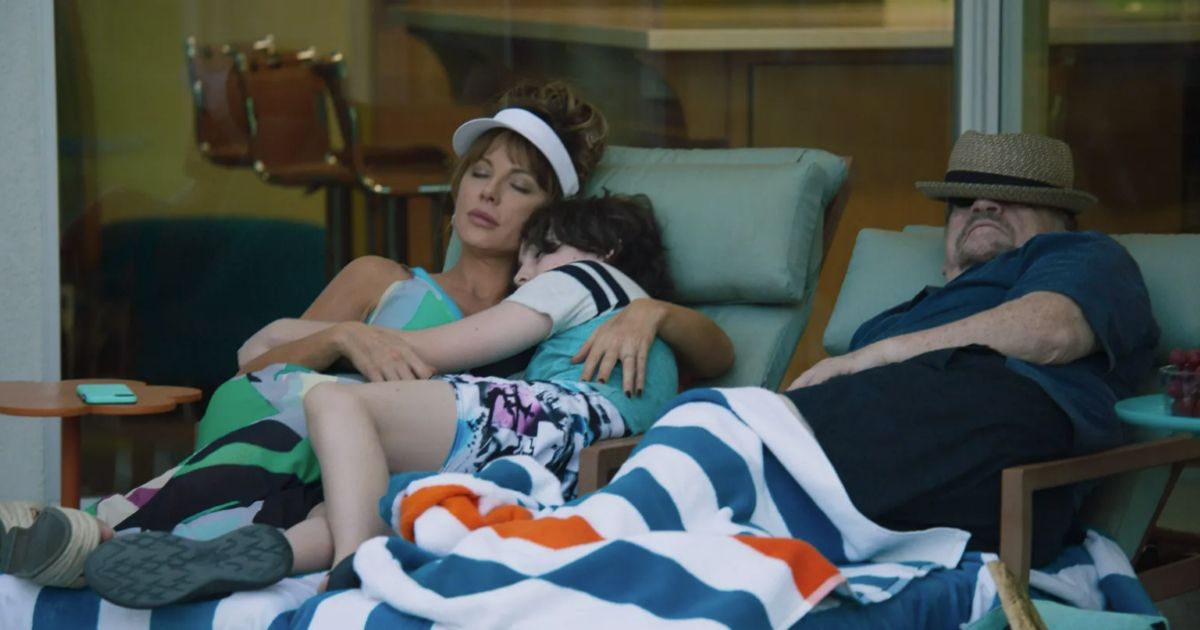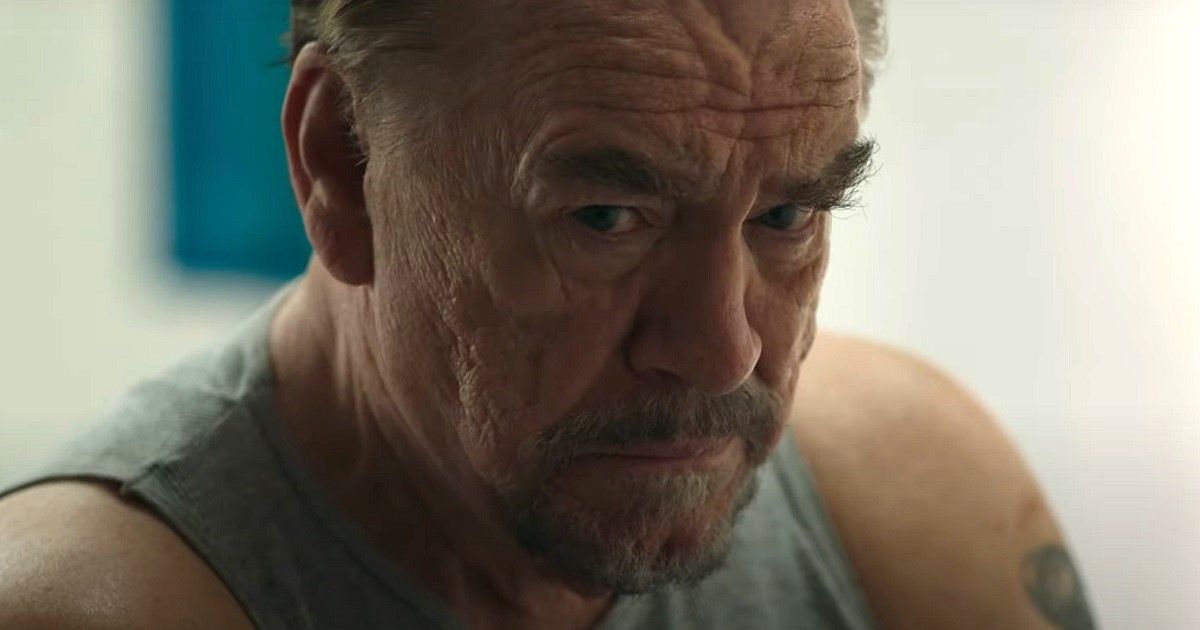At 77, Brian Cox is having one of the biggest years of his life. Yes, the great actor has been an enduring screen presence throughout the past half century, with films like Manhunter, Braveheart, Rushmore, and The Bourne Identity solidifying his place in the cinematic pantheon, but 2023 feels special.
Ending his four seasons on Succession as the powerful patriarch Logan Roy, Cox has been a household fixture this decade. Following his final bow in that show, Cox excelled in the quiet Sinqua Walls drama Mending the Line, and is now starring opposite Kate Beckinsale in the emotional new film, Prisoner’s Daughter.
Cox plays Max, an aging criminal inmate who is given a compassionate release from prison as cancer pulls him to the end of his life. In order to do so, he needs a place to stay, leading to a tense reconciliation with his estranged daughter, Maxine (Beckinsale). He bonds with his grandson, Ezra (Christopher Convery), who isn’t told Max’s actual identity, and together, the family confront hard times and the cycles of violence that plagued them.
It’s yet another wise casting choice for Cox in recent years. “The roles choose themselves, they come along with two or three scripts and then one just goes [snaps] that’s the one,” explained Cox. “And I’ve been very lucky.”
Cox spoke to MovieWeb about Catherine Hardwicke’s new film, the deep wells of emotion in it, and the special state of his career.
Brian Cox on His Kids and His Character
Prisoner’s Daughter features a beautiful role for Cox as a man who neglected his role as a father and spent much of his life outside bars using his skills as a fighter to assist criminals. He’s spent a long time in prison though, and is a respected, kind person who never had a real chance to redeem himself or try for a better life. With little time left alive, he tries to repair his relationships the best way he can, despite some outside threats.
Cox thinks the film is an exercise in empathy. “Absolutely, that’s right. And that’s what the script is. When this script was written, it was based on a real story,” explained Cox. “It’s somebody that knew somebody, and it touched him. And it’s the way that writer was touched that you take and bring to the world.” Cox continued:
Because he’s dying, there’s another dimension to it, a true sense of proportion. And I loved the part, I really did like the part and I thought it was very well written. And then of course, you have the violence. You have the old boy that comes out in the end, and that’s the only way he can acquit himself, tragically […] What he’s achieved is that love with his daughter, he’s got his love. She loved him when she was a little girl.
In fact, it was the poignant yet complex relationship between the father and his family that perhaps touched the actor most, and it’s reflected in Cox’s performance. “I’ve got these children, my youngest is 18, my eldest is 52, different family. But then I still remember them as kids, I still remember who they were as sentient beings who are just beginning to wake up to the world, and I find that incredibly moving,” reminisced Cox. He continued:
“You know, when I see them, I still go, ‘Oh my God.’ This is the advantage of this thing [Cox holds up a smartphone], because you can get all these photographs and you can loot, and it makes you cry. You go, ‘What happened? He was so sweet.’ Well he’s still sweet, but now he’s big!”
Prisoner’s Daughter Asks if Violence Is Necessary
Prisoner’s Daughter is focused on the common kind bond of humanity and the way that violence and cycles of trauma and abuse can shatter it, creating lasting divisions between people. Max was violent, his daughter grew up and had a son with a violent man, their son is being bullied and is grappling with how to fight back and the ramifications of fighting violence with violence. They’re all connected, even Maxine’s violent ex-husband (played by All-American Rejects frontman Tyson Ritter). They’re all threatened by others in certain ways, and tasked with confronting the question — is violence ever a good option?
Cox explained:
Of course, violence isn’t necessary, but there’s sometimes no way of avoiding it, and in Max’s case, he’s running out of time. The relationship between his daughter and her ex-partner is not resolved, and it’s not going to be resolved. And he sees that as trouble for his grandson and also his daughter, and he feels he has to do it, resolve it, and the only way you can resolve it is going back to his old ways for a brief instant.
Brian Cox on Religion and Audiences
The film isn’t didactic though; it doesn’t even really delve into flashbacks or much exposition of Max’s younger days as muscle for mobsters. It trusts the actors to display that past and the way the consequences of violence lingers in their memories. Cox, in turn, trusts the audience.
“I ultimately trust the audience. It’s down to the audience. We’re fellow human beings, so the tiniest things resonate with one another. That’s what we share,” explained Cox, before focusing on another frequent division among people — religion.
It’s one of the things that really annoys me about belief systems and like God and religion, Catholicism, Judaism, Islamism. It takes you away, it says, ‘Oh, it’s over there. It’ll all be happening over there. Finally, we’ll get up there.’ And I go, ‘It’s bollocks! It’s happening in here!’ And the power is in our imagination. It’s in our way that we can summon things, and also in our memory, what we hold with our past, the people who we’ve lost along the way, and how I know all of the people that I love, are still with me. They’re still here. They’re still present.
“And I think that you don’t have to do too much to ignite that for an audience,” continued Cox. “You just have to be present, and be omnipresent. And that’s the gift of a part like Max, is that you’re omnipresent. So you can really allow the audience to do the job, to do their part. It’s a celebration of humanism. It’s a celebration of our humanity, and the ups and downs of our humanity, and we don’t do that enough. We don’t. We do it without thinking, but we don’t realize how important that is and how it’s so much part of our lives, because of all the other stuff.”
If you want to celebrate humanity with Brian Cox, Vertical will release Prisoner’s Daughter in theaters June 30.
Stay connected with us on social media platform for instant update click here to join our Twitter, & Facebook
We are now on Telegram. Click here to join our channel (@TechiUpdate) and stay updated with the latest Technology headlines.
For all the latest Education News Click Here



